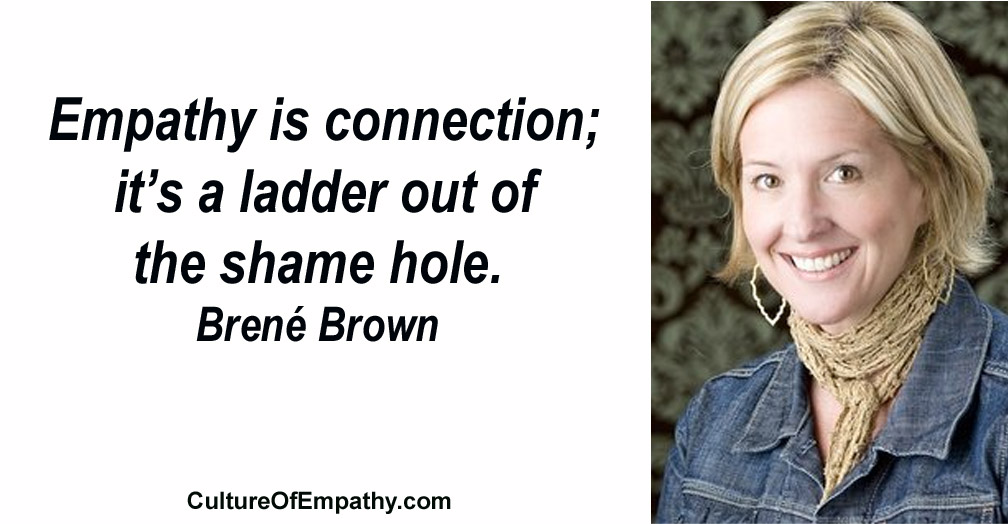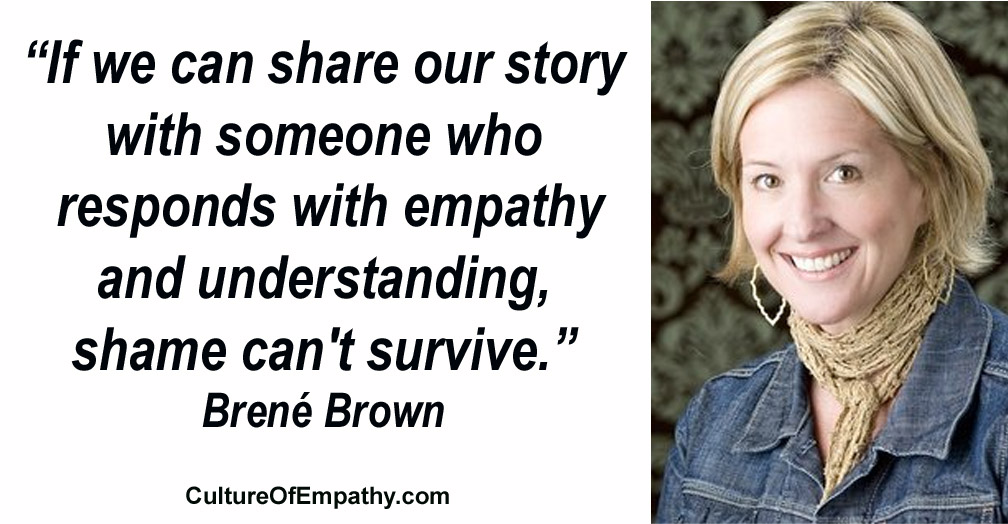|
|
|
Culture of Empathy Builder:
Brené Brown
Video: Shame &
Empathy
“I believe that what we regret most
are our failures of courage, whether it’s the courage to be kinder, to
show up, to say how we feel, to set boundaries, to be good to ourselves.
For that reason, regret can be the birthplace of empathy.”
Brené on Shame and Accountability
July 1, 2020
2012-04-15 -
Take a risk and put your true self out there
(CNN Video) -- Authenticity has become one of those buzzwords that we
love to hate. Like many other words that have met a similar fate after being
co-opted, misused, and overused, authenticity entered the popular lexicon
because it tapped into something powerful in our culture.
2012-04-02 - Shame, Empathy, and the Wholehearted Journey "I called
both my husband, Steve, and my good friend Karen. They gave me what I needed the
most: empathy, the best reminder that we’re not alone. Rather than judgment
(which exacerbates shame), empathy conveys a simple acknowledgment, “You’re not
alone, I’ve been there.”
Empathy is connection; it’s a ladder out of the shame hole. Not only did Steve
and Karen help me climb out by listening and loving me, but they made themselves
vulnerable by sharing that they too had spent some time in the same hole."
2012-05-16 - Shame Resilience Theory By Steve Safigan
"Shame resilience theory (SRT) was developed by researcher and
author Brené Brown in 2006.
Forming mutually empathetic relationships that facilitate
reaching out to others: When we reach out for support, we may receive empathy,
which is incompatible with shame and judgment. We recognize that our most
isolating experiences are also the most universal. We recognize that we are not
defective or alone in our experiences (we normalize).
to be able to see the world as others see it
to be nonjudgmental
to understand another person’s feelings
to communicate your understanding of that person’s
feelings
Brown defines empathy as a skill, and so she stresses
actively practicing giving and receiving empathy."
“When we start losing our tolerance for
vulnerability, uncertainty, for risk — we move away from the things we
need and crave the most like joy and love and belonging, trust, empathy,
creativity.” Brené Brown
"If you put shame in a petri dish, it needs three ingredients to
grow exponentially: secrecy, silence, and judgment. If you put the same
amount of shame in the petri dish and douse it with empathy, it can't
survive." From Tedtalks, Brene Brown
RSA Talk: The Power
of Vulnerability - Brene Brown
"Influential author and speaker Dr Brené Brown tackles the myth that
vulnerability is a weakness. Instead, she argues, it is the clearest
path to courage and meaningful connection, and has the power to
transform the way we engage and educate."
What to be afraid of and who is to blame?
scarcity culture: never enough - never good enough
self protection: against judgment, etc
needs for love and belonging - painful not to have it
vulnerability is path to joy, love, trust,
What is empathy? and why is it different than sympathy
empathy fuels connection - feeling with people
sympathy drives disconnection
Empathy is this kind of sacred space
Sympathy gets in the way of empathy
Blame
Shame - I am bad - focus on self
Guilt - I did something bad - focus on behaviour
RSA Shorts - The
Power of Empathy
Brene Brown - Boundaries, Empathy, and Compassion
Jan 7, 2013 - Brené Brown - Embracing Vulnerability
How many of you would agree that we are in a serious
empathy deficit in our culture today?
Not vulnerability - no empathy
In a culture where people are afraid to be vulnerable,
you can't have empathy.
Empathy is not a default response.
If you share something with me that's difficult, in
order for me to be truly empathic, I have to step into what your
feeling, and that's vulnerable. So there can be no empathy
without vulnerability.
Story of bullying and shaming.
08/26/2013 -
Brené Brown: "Shame Is Lethal"
Shame - the intensely painful feeling that we are
unworthy of love and belonging
shame related to sexual abuse
shame is deadly and lethal and we are swimming in it
deep.
shame - The less you talk about it, the more you got it
shame needs three things to grow in our lives: secrecy,
silence and judgment
Brené: "You put the same amount of shame in a petri dish and
you dowse it with empathy, you've create an environment that is
hostile to shame. Shame cannot survive being spoken. It can't survive
empathy. If I call you and something very shaming happened to me, and I
call you... and I tell you, and you express empathy, shame can't survive
it. Shame depends on me buying into the belief that I am alone, "
Brené: When
I say I study shame, people say either "I don't know what you're talking
about" or "I know exactly what you're talking about, and I'm not talking
about that." But the less you talk about it, the more you've got it.
Shame needs three things to grow exponentially: secrecy, silence, and
judgment. So if something shaming happens to me and I call you and say,
"Oh, Oprah, you're not gonna believe what happened," and you express
empathy—shame can't survive that. It depends on my belief that I'm
alone....
Oprah: You
have such a beautiful definition of connection. I actually put it on my
iPad, in the place where I keep quotes. "Connection is the energy that
is created between people when they feel seen, heard, and valued; when
they can give and receive without judgment." That made me weep.
08/26/2013 - Oprah and Brené Brown, Parts 1 and 2
May 15, 2013The Wholehearted Life: Oprah Talks to Brené Brown January 24, 2011 - Whole-hearted Living By Steve Safigan
2010-10-16 - TEDxHouston - Brené Brown - Shame
2010-06-00 - Brene Brown: The power of vulnerability
"So very quickly -- really about six weeks into this research -- I ran into this unnamed thing that absolutely unraveled connection in a way that I didn't understand or had never seen. And so I pulled back out of the research and thought, I need to figure out what this is. And it turned out to be shame. And shame is really easily understood as the fear of disconnection: Is there something about me that, if other people know it or see it, that I won't be worthy of connection? The things I can tell you about it: it's universal; we all have it. The only people who don't experience shame have no capacity for human empathy or connection. No one wants to talk about it, and the less you talk about it the more you have it. What underpinned this shame, this "I'm not good enough," -- which we all know that feeling: "I'm not blank enough. I'm not thin enough, rich enough, beautiful enough, smart enough, promoted enough." The thing that underpinned this was excruciating vulnerability, this idea of, in order for connection to happen, we have to allow ourselves to be seen, really seen. "
2008-02-02 PBS Interview 1st of 2
2007-04-17 Shame &
Empathy by Dr. Brené Brown
"And blaming is
very corrosive in relationships. and it's one of the reasons we miss our
opportunity for empathy. Because when we hear a story we're not
really listening,...making the connections as quickly as possible about
who's fault something was"
|
|
||||








